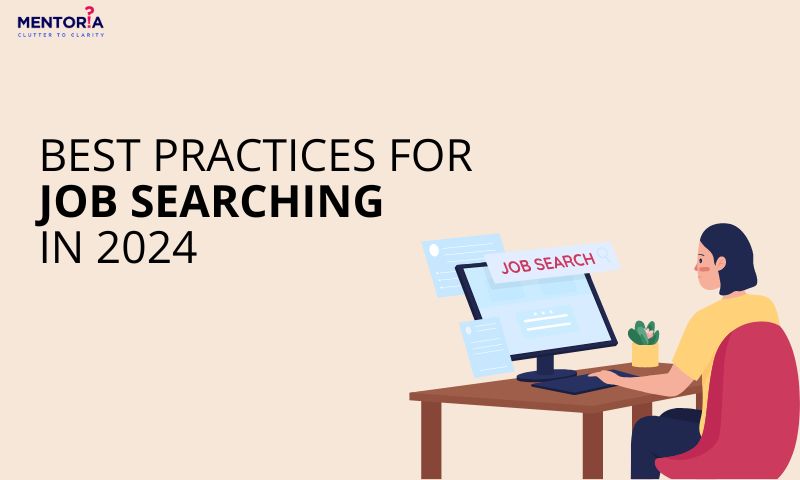Best Practices For Job Searching In 2024

Feeling overwhelmed by the job search process and not sure how to navigate the competitive job market of 2024? If you’re feeling lost and looking for a better approach, you’re heading in the right direction. The job search game is always changing, and what used to work might not cut it anymore. That’s where mentoria comes in to help you find the perfect career path. We offer career counselling no matter where you are in your career journey. With our 4-step process, we can match you with the best career out of 3 streams, 850+ courses, and 12,000+ career options. Find out more about what we offer here. In this article, we’ll delve into the most up-to-date tips for job hunting in 2024. From using technology to networking effectively, we’ll discuss all the essentials to help you secure your ideal job in today’s market.
Where You Can Search For The Job

- Digital Job Platforms: These online hubs serve as bridges between job seekers and employers, offering a vast array of job postings. Well-known platforms such as Indeed, Glassdoor, LinkedIn, and Naukri.com allow job seekers to create profiles, upload resumes, and receive tailored job alerts. They provide a user-friendly interface for exploring diverse job opportunities and connecting with potential employers.
- Corporate Career Pages: Many companies showcase their job openings directly on their websites, typically under dedicated sections like “Careers” or “Jobs”. Job seekers can visit these pages to discover available positions, gain insights into the company culture, and submit their applications online. Corporate websites often provide detailed job descriptions, requirements, and application guidelines, enabling candidates to craft targeted applications.
- Recruitment Agencies and Staffing Firms: These firms focus on connecting individuals looking for work with appropriate job opportunities. They have wide-ranging connections with employers and typically concentrate on particular industries or types of jobs. Individuals seeking employment can sign up with these firms, send in their resumes, and potentially be matched with relevant job vacancies. Recruitment agencies are essential in helping job seekers secure positions that match their qualifications and background.
- Networking for Job Search: Making connections is key when searching for a job. By networking, job seekers can access job referrals and hidden job opportunities that are not publicly advertised. Professional associations, industry events, and social media platforms such as LinkedIn are great ways to network and expand your job search beyond traditional methods.
- Job Fairs and Career Expos: Job Fairs and Career Expos are fantastic chances for people looking for jobs to meet with potential employers and check out various job opportunities. These events typically feature a variety of companies from different industries, providing a diverse range of career paths.
- Government Job Portals: Many governments operate online portals where job seekers can find information about public sector job openings. These portals offer a centralised platform for government agencies to advertise vacancies and for job seekers to search and apply for positions. They cover opportunities at the local, state, and national levels, spanning various departments and sectors.
- Print Media Job Advertisements: Although online job boards have largely replaced traditional print media, some job openings are still advertised in newspapers, especially local or regional publications. Job seekers can consult newspaper classifieds for job listings in their area and follow the application instructions provided.
- Using Social Media for Job Hunting: Social media platforms such as LinkedIn, Facebook, and Twitter can be incredibly useful for individuals searching for employment opportunities. LinkedIn, in particular, is widely recognised as a platform for professional networking and job searching. Job seekers can take advantage of these platforms to establish connections with recruiters and hiring managers, keep track of companies they are interested in, and stay updated on available job positions. In fact, some companies solely rely on social media to advertise job openings, making it an invaluable resource for those seeking employment.
6 Tips To Search For A Job Effectively
Define Your Goal
The first step is to set a clear goal for your career. Think about what kind of job you want and what you want to achieve in your work life. Instead of applying randomly to many jobs, which is a common mistake, take some time to analyse which job would be the best fit for you based on your skills, knowledge, and preferences.
Next, evaluate your strengths and professional experience related to the position you’re interested in. Make sure that you have the necessary qualifications and experience for the job you aspire to. It’s important to match your skills and experiences with the job requirements to increase your chances of success. This approach will help you focus your job search and increase your chances of finding a job that is right for you.
This step is key to making your selection process more effective. If you know in advance what the most important requirements for the position are, you will know how to present yourself better to your future company. This will help you in the rest of the selection process since in this way you will be able to highlight your strengths easily.
Networking: How To Increase Your Professional Circle Effectively?
Networking is a great way to grow your professional connections and boost your career. Attending industry events like conferences, workshops, or seminars is a smart move to expand your network. These events offer chances to meet and mingle with other professionals in your field. For instance, going to a marketing conference might lead to meeting a potential client or employer. Another effective networking strategy is to join professional groups or associations that are relevant to your industry. These organisations frequently host networking gatherings and offer a space for sharing insights and experiences with colleagues.Moreover, leveraging social media platforms such as LinkedIn can also help you broaden your network on a global scale. Participating in discussions, sharing valuable content, and connecting with industry influencers can all contribute to building strong and meaningful relationships.
Make Correct Use Of Your Social Networks
Consider the importance and impact of your profile on the social networks used to search for work. For example, on your LinkedIn page, you must convey a professional image, with an appropriate profile photo, share interesting content related to your sector, and engage appropriately.
It is also important that the information in your professional profile matches that of your CV and the rest of the documents of your job search. Sometimes, recruiters check networks to verify the dates, positions, and locations of your previous companies. If there are inconsistencies between the data on your resume and what you indicate in your networks, this can undermine your credibility.
Always Have A Well-Written And Updated Resume
Making a solid resume is crucial because it represents you professionally. Your resume and cover letter need to be organised and tailored, highlighting your key information. This should encompass your details, education, and work history, as well as your skills relevant to the job. The goal is for recruiters to easily see that you are the perfect fit for the role.
If you don’t have any experience, make sure to create a functional resume that focuses on your academic qualifications, internships, and volunteer activities. It’s important to highlight your eagerness to learn and kickstart your career. On the other hand, if you have a lot of experience, opt for chronological resume templates that emphasise your expertise and professional skills.
Preparing For Your Interviews
Facing interviews can be stressful for many people since we are risking our future. One of the keys to going calmly is to be clear about everything you should project into it. Since you know the offer and your resume, you already know what you should explain and highlight during the interview.
If you need it, you can do breathing exercises before starting, to try to control your nerves and stay relaxed during the session. Of course, never resort to alcohol or medications, since these limit your attention and your ability to respond.
Don’t forget to dress appropriately, even if your interview is via video call, as your appearance is another element of who you are. The same thing happens with non-verbal language, which is another aspect that recruiters will evaluate. So, be careful with certain postures that show sloppiness and disinterest during the interview.
Here’s a breakdown of how to prepare for interviews:
- Anticipate Questions: Research common interview questions in your industry and role. Practise answering them with examples from your experience. For instance, if you’re interviewing for a customer service role, you might be asked about handling difficult customers.
- Prepare Counter Answers/Solutions: Identify potential weaknesses in your background and prepare responses that showcase your strengths and problem-solving abilities. If you lack experience in a required software programme, explain how you quickly learned a similar one in the past.
- Know What to Ask For: Research the salary range for the position and location. Be ready to negotiate if an offer is made. Consider other factors like benefits, work-life balance, and growth opportunities.
- Negotiating Pay: When discussing pay, highlight your value and how your skills align with the company’s needs. Provide examples of your accomplishments to demonstrate your worth. For example, you could suggest a salary range based on your research and experience.
By following these steps and practising your responses, you’ll be more confident and ready for your interviews.
Track Your Requests
To have an idea of how recruitment technicians are evaluating your profile, it is very important to keep track of the offers you have requested. Although privacy policies make it somewhat difficult, on certain websites it is easy to see the status of your application.
If you see that time passes and you are adding discards in the selection processes, it is advisable to review the entire process again. Take a look at your CV, your cover letter and your attitude in interviews to see where you can improve. Think that each interview helps you practise and gain more experience, which brings you closer to your goal.
Best Job Sites In India
India has a plethora of excellent websites where you can discover job listings. Here are some of the top ones:
- Naukri.com: This website has been around for quite a while and boasts a vast array of job listings from various industries and locations. It even assists you in creating your resume and sends you job alerts.
- Indeed: Indeed is a big job search site that pulls together job postings from many places, like company websites and other job boards. You can search for jobs easily by using keywords, location, and company names.
- Monster India: Monster India offers a wide range of job listings and also provides services such as career advice and resume assistance.
- LinkedIn: Although LinkedIn is primarily used for professional networking, you can also find job postings there. It allows you to connect with recruiters and showcase your professional profile.
- Shine.com: Shine.com is a popular job portal in India that offers job listings across various industries and locations. It also provides services like resume writing and career guidance.
- TimesJobs: TimesJobs, which is part of the Times Group, provides job listings across various industries and locations in India. It also offers career services like resume writing and job alerts.
- Glassdoor: Glassdoor offers more than just job listings. It also provides company reviews, salary information, and interview tips to assist job seekers in making well-informed choices.
- Freshersworld: Freshersworld is a job portal specifically designed for fresh graduates and entry-level job seekers. It offers job listings, internship opportunities, and career guidance for freshers.
- FlexJobs: Features a wide range of remote and flexible job opportunities, screening all listings to ensure they are legitimate and high-quality.
- Remote OK: A job board specifically dedicated to remote job listings, featuring jobs from companies worldwide and allowing users to filter by job type, location, and skill level.
These websites are widely utilised in India and present a multitude of job opportunities for job seekers.
Navigating The Job Market
To sum up, becoming a pro at job hunting calls for a well-rounded strategy. You need to grasp the ins and outs of the job market, craft an outstanding resume, build a strong online presence, make the most of job search platforms, strategically network, write captivating cover letters, ace interviews and assessments, and gracefully navigate the post-interview phase. By doing all this, you’ll increase your chances of getting your ideal job. Remember, staying determined, continuously learning, and adapting to changes in the job market are important for a successful job search. Best of luck!
Mentoria is here to help you with your job search. Our platform provides personalised guidance, industry insights, and access to a network of professionals to make your job search easier. We offer support with resume building, interview preparation, and navigating the digital job market. Let Mentoria be your partner in finding your dream job and start your successful career journey today.









